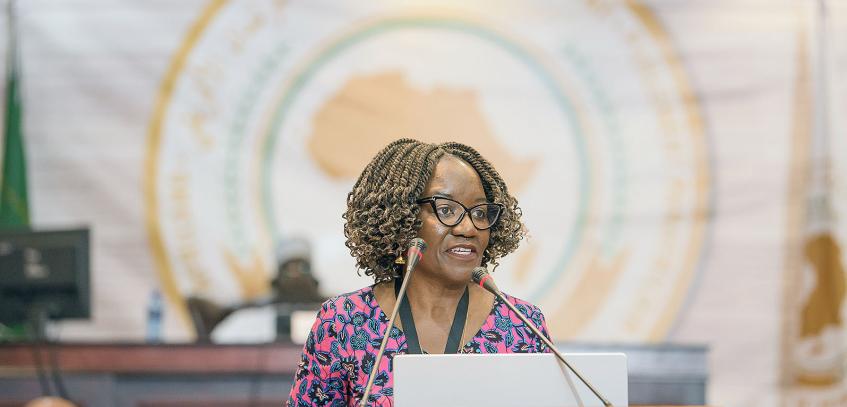At the Fourth Ordinary Session of the Sixth Parliament of the Pan-African Parliament, under the African Union's theme, “Educate an African Fit for the 21st Century: Building Resilient Education Systems for Increased Access to Inclusive, Lifelong, Quality, and Relevant Learning in Africa,” key presentations highlighted the challenges and aspirations shaping Africa’s future. The theme emphasized the continent's mission to nurture educated, resilient, and empowered citizens capable of driving sustainable growth.
Her Excellency Dr. Monique Nsanzabaganwa, Deputy Chairperson of the African Union Commission, addressed the esteemed Assembly, emphasizing the critical role of the Pan-African Parliament in advancing Agenda 2063, the continent’s blueprint for a united and prosperous future. She underscored the importance of aligning parliamentary efforts with the African Union’s larger plans, including its newly adopted five-year strategy. In a call to action, she urged parliamentarians to act as ambassadors of Agenda 2063, advocating for its integration into national budgets and policy frameworks.
Reflecting on financial sustainability, Dr. Nsanzabaganwa acknowledged both progress and setbacks in the AU’s journey toward self-financing. While member states had successfully met the initial target of fully funding the AU's operational budget, contributions to the program budget had significantly declined. The Peace Support Operations budget, despite recent achievements, continued to face shortfalls. Notably, the underperformance of the 0.2% import levy imposed on member states presented a significant challenge to the vision of a self-reliant AU. She urged the Pan-African Parliament to advocate for timely and complete financial contributions, as well as to strengthen domestic resource mobilization, ensuring that Africa’s resources fund its own ambitions.
Eva Grace Kuvuma, Interim Group Director General of the African Risk Capacity (ARC), then presented ARC's critical role in building resilience against climate-related disasters. Since its establishment in 2012, ARC has worked with African governments to mitigate the impacts of weather-induced threats and disease outbreaks. Offering services such as capacity building, early warning systems, and risk pooling, ARC currently supports 39 member states, although only 14 have ratified the ARC Treaty. Kuvuma called for greater political support from the Pan-African Parliament, urging parliamentarians to champion ARC as a uniquely African solution to the continent's challenges. By investing in ARC and encouraging participation in its risk pools, member states could significantly enhance their resilience to climate-related impacts.
Dr. Msingathi Sipuka, Chief of Staff for AUDA-NEPAD, passionately addressed the importance of industrialization for economic resilience, particularly in the face of global economic challenges. He acknowledged Africa's progress in sectors such as automotive production, textiles, and cocoa processing, citing countries like Morocco, South Africa, Mauritius, Ghana, and Côte d'Ivoire as examples of success. However, Dr. Sipuka noted that Africa still contributes less than 2% to global manufacturing and faces significant barriers such as inadequate infrastructure, a widening skills gap, and regulatory challenges. He highlighted AUDA-NEPAD's strategies to address these obstacles, including initiatives in agriculture, health, digital infrastructure, and special economic zones, all aligned with frameworks like Agenda 2063 and the African Continental Free Trade Area (AfCFTA). By prioritizing education, healthcare, infrastructure, and innovation, Africa could build a robust manufacturing sector capable of supporting sustainable growth.
Honorable Remy Ngoy Lumbu, Chairperson of the African Commission on Human and Peoples’ Rights, delivered a powerful message on the urgent need to advance democracy and human rights across the continent. He expressed concern over ongoing challenges, particularly those affecting youth, women, and children. He also highlighted the human rights dimensions of migration, urging governments to strengthen efforts to prevent the tragic loss of life, particularly in perilous migration routes such as those crossing the Mediterranean.
These presentations collectively underscored the interconnected priorities of financial sustainability, climate resilience, industrial growth, and human rights. The speakers reminded the Assembly that the Pan-African Parliament has a vital role in shaping an empowered, self-sufficient, and resilient Africa. As discussions unfolded, it became clear that these issues are deeply interrelated and central to the continent's aspirations for a sustainable future—an Africa where its people thrive, its economies grow, and its unity prevails.








